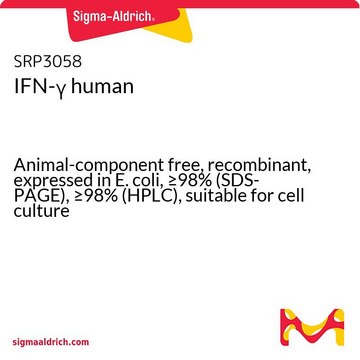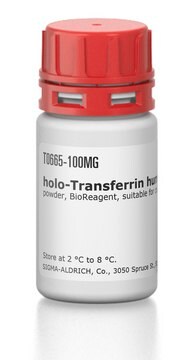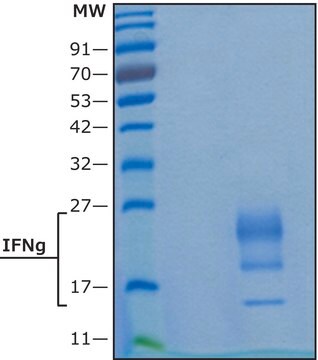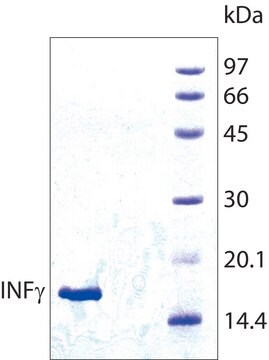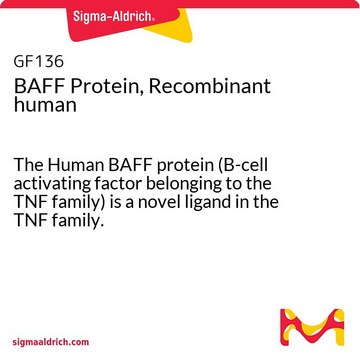SRP3305
BAFF human
Animal-component free, recombinant, expressed in E. coli, ≥98% (SDS-PAGE), ≥98% (HPLC)
Synonim(y):
TALL-1, THANK, TNFSF13B, TNFSF20
Zaloguj sięWyświetlanie cen organizacyjnych i kontraktowych
About This Item
Kod UNSPSC:
12352202
NACRES:
NA.32
Polecane produkty
pochodzenie biologiczne
human
rekombinowane
expressed in E. coli
Próba
≥98% (HPLC)
≥98% (SDS-PAGE)
Formularz
lyophilized
masa cząsteczkowa
17.0 kDa
opakowanie
pkg of 20 μg
zanieczyszczenia
endotoxin, tested
numer dostępu UniProt
Warunki transportu
wet ice
temp. przechowywania
−20°C
informacje o genach
human ... TNFSF13B(10673)
Opis ogólny
BAFF, a member of the TNF superfamily of ligands, is expressed in T cells, macrophages, monocytes and dendritic cells. BAFF is involved in stimulation of B and T cell function, and is an important survival and maturation factor for peripheral B cells. BAFF signals through three different TNF receptors TACI, BCMA and BAFF-R. The human BAFF gene codes for a 285 amino acid type II transmembrane protein containing a 46 amino acid cytoplasmic domain, a 21 amino acid transmembrane domain, and a 218 amino acid extracellular domain. Recombinant human soluble BAFF is a 152 amino acid polypeptide (17.0 kDa), which contains the TNF-like portion of the extracellular domain of BAFF.
Działania biochem./fizjol.
BAFF, a member of the TNF superfamily of ligands, is expressed in T cells, macrophages, monocytes and dendritic cells. Recombinant human soluble BAFF is a 152 amino acid polypeptide (17.0 kDa), which contains the TNF-like portion of the extracellular domain of BAFF.
Postać fizyczna
Lyophilized from 20 mM Tris, pH 8.0 + 150mM NaCl.
Rekonstytucja
Centrifuge the vial prior to opening. Reconstitute in water to a concentration of 0.1-1.0 mg/ml. Do not vortex. This solution can be stored at 2-8°C for up to 1 week. For extended storage, it is recommended to further dilute in a buffer containing a carrier protein (example 0.1% BSA) and store in working aliquots at -20°C to -80°C.
Ta strona może zawierać tekst przetłumaczony maszynowo.
Kod klasy składowania
11 - Combustible Solids
Klasa zagrożenia wodnego (WGK)
WGK 3
Temperatura zapłonu (°F)
Not applicable
Temperatura zapłonu (°C)
Not applicable
Wybierz jedną z najnowszych wersji:
Certyfikaty analizy (CoA)
Lot/Batch Number
Nie widzisz odpowiedniej wersji?
Jeśli potrzebujesz konkretnej wersji, możesz wyszukać konkretny certyfikat według numeru partii lub serii.
Masz już ten produkt?
Dokumenty związane z niedawno zakupionymi produktami zostały zamieszczone w Bibliotece dokumentów.
Rita R Barbosa et al.
Journal of clinical immunology, 34(5), 573-583 (2014-05-09)
B-cell survival and differentiation critically depend on the interaction of BAFF-R and TACI with their ligands, BAFF and APRIL. Mature B-cell defects lead to Common Variable Immunodeficiency (CVID), which is associated with elevated serum levels of BAFF and APRIL. Nevertheless
T J Waldschmidt et al.
Science (New York, N.Y.), 293(5537), 2012-2013 (2001-09-15)
What determines whether transitional B cells newly emerged from the bone marrow will differentiate further to become mature, long-lived, circulating B lymphocytes? In a Perspective, Waldschmidt and Noelle discuss new findings showing that the TNF family ligand BAFF and its
Xiao-Juan Zhu et al.
British journal of haematology, 166(5), 783-791 (2014-06-04)
To investigate the expression of tumour necrosis factor superfamily 13B (TNFSF13B) receptors in immune thrombocytopenia (ITP) and their correlation with disease activity, we investigated the protein and mRNA levels of TNFSF13B, tumour necrosis factor receptor superfamily 13C (TNFRSF13C), TNFRSF13B and
Nuoyan Zheng et al.
BMC nephrology, 16, 72-72 (2015-05-16)
B cell activating factor belonging to the TNF family (BAFF) is vital for B cell survival, proliferation and activation. Evidence indicates that BAFF is systemically or locally increased in glomerulonephritis (e.g. lupus nephritis, IgA nephropathy). However, the effect of BAFF
J Wild et al.
Leukemia, 29(8), 1676-1683 (2015-02-25)
Natural killer (NK) cells are cytotoxic lymphocytes that substantially contribute to the therapeutic benefit of antitumor antibodies like Rituximab, a crucial component in the treatment of B-cell malignancies. In chronic lymphocytic leukemia (CLL), the ability of NK cells to lyse
Nasz zespół naukowców ma doświadczenie we wszystkich obszarach badań, w tym w naukach przyrodniczych, materiałoznawstwie, syntezie chemicznej, chromatografii, analityce i wielu innych dziedzinach.
Skontaktuj się z zespołem ds. pomocy technicznej